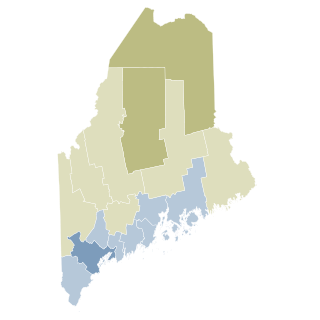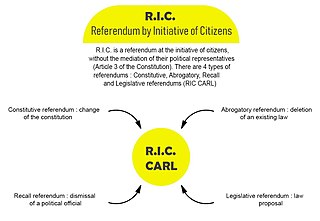| ||||||||||||||||||||||
Referendum on Amendments to the Family Allowances Act | ||||||||||||||||||||||
| Results | ||||||||||||||||||||||
|---|---|---|---|---|---|---|---|---|---|---|---|---|---|---|---|---|---|---|---|---|---|---|
| ||||||||||||||||||||||
 Results by municipality | ||||||||||||||||||||||
 |
|---|
A referendum on amendments to the Family Allowances Act was held in Liechtenstein on 18 September 2016. [1] The amendments were rejected by 82% of voters.
| ||||||||||||||||||||||
Referendum on Amendments to the Family Allowances Act | ||||||||||||||||||||||
| Results | ||||||||||||||||||||||
|---|---|---|---|---|---|---|---|---|---|---|---|---|---|---|---|---|---|---|---|---|---|---|
| ||||||||||||||||||||||
 Results by municipality | ||||||||||||||||||||||
 |
|---|
A referendum on amendments to the Family Allowances Act was held in Liechtenstein on 18 September 2016. [1] The amendments were rejected by 82% of voters.
The amendments to the Family Allowances Act would introduce paid maternity leave for 20 weeks, financed by companies, although they would not have to pay the health insurance during this period. They would also introduce daily rates for child care centres. [1]
A referendum was forced after the Chamber of Commerce collected 1,179 signatures between 8 April and 11 May 2016. After validation, 1,144 were deemed valid, meeting the requirement of article 64 of the constitution for at least 1,000 signatures.
The Landtag approved the holding of a referendum on 9 June by a vote of 13–12, making a referendum optional rather than compulsory. A second vote on an amendment by the Progressive Citizens' Party passing by 19 votes to six nonetheless agree on organising the referendum. [1] The government set the date of the referendum on 14 June. [1]
| Choice | Votes | % | |
|---|---|---|---|
| For | 2,099 | 17.61 | |
| Against | 9,823 | 82.39 | |
| Total | 11,922 | 100.00 | |
| Valid votes | 11,922 | 98.99 | |
| Invalid votes | 109 | 0.91 | |
| Blank votes | 13 | 0.11 | |
| Total votes | 12,044 | 100.00 | |
| Registered voters/turnout | 19,765 | 60.94 | |
| Source: Government of Liechtenstein | |||

A popular initiative is a form of direct democracy by which a petition meeting certain hurdles can force a legal procedure on a proposition.
The Eighth Amendment of the Constitution Act 1983 was an amendment to the Constitution of Ireland which inserted a subsection recognising "the equal right to life of the pregnant woman and the unborn". Abortion had been subject to criminal penalty in Ireland since at least 1861; the amendment ensured that legislation or judicial interpretation would be restricted to allowing abortion in circumstances where the life of a pregnant woman was at risk. It was approved by referendum on 7 September 1983 and signed into law on 7 October 1983. In 2018, it was repealed by referendum.
An ordinary referendum in Ireland is a referendum on a bill other than a bill to amend the Constitution. The Constitution prescribes the process in Articles 27 and 47. Whereas a constitutional referendum is mandatory for a constitutional amendment bill, an ordinary referendum occurs only if the bill "contains a proposal of such national importance that the will of the people thereon ought to be ascertained". This is decided at the discretion of the President, after a petition by Oireachtas members including a majority of Senators. No such petition has ever been presented, and thus no ordinary referendum has ever been held.
The Twenty-seventh Amendment of the Constitution Act 2004 amended the Constitution of Ireland to limit the constitutional right to Irish citizenship of individuals born on the island of Ireland to the children of at least one Irish citizen and the children of at least one parent who is, at the time of the birth, entitled to Irish citizenship. It was approved by referendum on 11 June 2004 and signed into law on 24 June of the same year. It affected in part changes made to the Constitution by the Nineteenth Amendment of the Constitution of Ireland which was passed as part of the Good Friday Agreement.
The Constitution Alteration Bill 1946, was a successful proposal to alter the Australian Constitution to give the Commonwealth power over a range of social services. The question was put to a referendum in the 1946 Australian referendum with two other (unrelated) questions. It was carried and inserted into section 51 of the Australian Constitution.
Same-sex marriage has been legal in Liechtenstein since 1 January 2025. In November 2022, the Landtag passed a motion calling on the government to introduce a bill legalizing same-sex marriage, with broad support from across the political spectrum. A bill legalizing same-sex marriage was introduced in February 2024 and passed its final reading in the Landtag on 16 May 2024 by a 24–1 vote. It received royal assent from Prince Alois on 9 July 2024. Polling suggests that a majority of Liechtensteiners support the legal recognition of same-sex marriage.

The Fifteenth Amendment of the Constitution Act 1995 is an amendment of the Constitution of Ireland which removed the constitutional prohibition on divorce, and allowed for the dissolution of a marriage provided specified conditions were satisfied. It was approved by referendum on 24 November 1995 and signed into law on 17 June 1996.
People's initiative is a common appellative in the Philippines that refers to either a mode for constitutional amendment provided by the 1987 Philippine Constitution or to the act of pushing an initiative allowed by the Philippine Initiative and Referendum Act of 1987. The appellative also refers to the product of either of those initiatives.

The Crimes Amendment Act 2007 is an amendment to New Zealand's Crimes Act 1961 which removed the legal defence of "reasonable force" for parents prosecuted for assault on their children.

The 2009 New Zealand Referendum on Child Discipline was held from 31 July to 21 August, and was a citizens-initiated referendum on parental corporal punishment. It asked:
Should a smack as part of good parental correction be a criminal offence in New Zealand?

Alois, Hereditary Prince of Liechtenstein is the eldest son of Hans-Adam II, Prince of Liechtenstein, and Countess Marie Kinsky von Wchinitz und Tettau, and the heir apparent to the throne of Liechtenstein. Alois has been regent of the country since 15 August 2004, while his father remains the official head of state.

Maine Question 1 was a voter referendum on an initiated state statute that occurred on November 6, 2012. The referendum was held to determine whether or not to legalize same-sex marriage. The referendum passed with a 53-47% vote legalizing same-sex marriage in Maine.

The Scotland Act 2016 is an act of the Parliament of the United Kingdom. It sets out amendments to the Scotland Act 1998 and devolves further powers to Scotland. The legislation is based on recommendations given by the report of the Smith Commission, which was established on 19 September 2014 in the wake of the Scottish independence referendum.

A referendum on the Health Insurance Act was held in Liechtenstein on 13 December 2015. It was approved by 53% of voters.
Events in the year 2016 in Liechtenstein.

The Référendum d'initiative Citoyenne is the name given to the proposal for a constitutional amendment in France to permit consultation of the citizenry by referendum concerning the proposition or abrogation of laws, the revocation of politicians' mandates, and constitutional amendment.

The Thirty-eighth Amendment of the Constitution of Ireland is an amendment to the Constitution of Ireland which altered the provisions regulating divorce. It removed the constitutional requirement for a defined period of separation before a Court may grant a dissolution of marriage, and eased restrictions on the recognition of foreign divorces. The amendment was effected by an act of the Oireachtas, the Thirty-eighth Amendment of the Constitution Act 2019.
Several federal referendums were held in Switzerland in 2020, with voting on 9 February, 27 September and 29 November. Voting was also planned for 17 May, but was postponed due to the COVID-19 pandemic.
There have been 18 referendums in New South Wales, 8 of which concerned proposals to amend the New South Wales Constitution, half of which concerned the Legislative Council. While the Constitution of Australia was adopted after the 1898 and 1899 referendums in all of the proposed states, the Constitution of New South Wales, promulgated in 1902, was an Act of the Parliament of New South Wales which could be amended by Parliament. Since 1927 the Constitution has included provisions that can only be amended following approval in a referendum. 8 of the referendums, including 5 on the sale of alcohol, did not involve any proposed amendment to the Constitution. While these have traditionally been called referendums, they could also be described as plebiscites.
Two referendums were held in Liechtenstein during 2022. The first was held on 26 June 2022, in which voters decided on an exemption for pensioners from paying the annual deductible of the national health insurance. The second was held on 18 September on COVID-19 legislation.